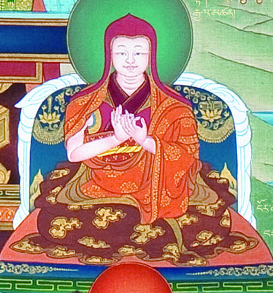Ngor Monastery: Difference between revisions
Jump to navigation
Jump to search
No edit summary |
No edit summary |
||
| Line 12: | Line 12: | ||
==Further Reading== | ==Further Reading== | ||
*Ronald Davidson, 'The Ngor-pa Tradition' in ''Wind Horse'', vol. 1, 1981, pp.79-98 | |||
*David Jackson, 'Sources on the Chronology and Succession of the Abbots of Ngor E-waṃ-chos-ldan', Berliner Indologische Studien. Band 4/5: 49-93, 1989. | *David Jackson, 'Sources on the Chronology and Succession of the Abbots of Ngor E-waṃ-chos-ldan', Berliner Indologische Studien. Band 4/5: 49-93, 1989. | ||
*David P. Jackson, 'The 'Bhutan Abbot' of Ngor: Stubborn Idealist with a Grudge against Shugs-ldan' in ''Lungta 14'', 2001 | *David P. Jackson, 'The 'Bhutan Abbot' of Ngor: Stubborn Idealist with a Grudge against Shugs-ldan' in ''Lungta 14'', 2001 | ||
Revision as of 11:59, 7 November 2010

Ngor Monastery (Wyl. ngor evaṃ chos ldan) — an important Sakya monastery, and seat of the Ngor subschool, established by Ngorchen Kunga Zangpo around 1430. Before being completely demolished during the Chinese invasion, it was a very active monastery, counting about 1,000 monks in the 1950s. It has only been partly reconstructed.
Ngor Monastery is divided into four monastic houses (Tib. labrang; Wyl. bla brang):
- Luding,
- Khangsar,
- Thartse and
- Phende.
Ngor Monastery in Exile
- Ngor Monastery was reestablished in Manduwala, India
Further Reading
- Ronald Davidson, 'The Ngor-pa Tradition' in Wind Horse, vol. 1, 1981, pp.79-98
- David Jackson, 'Sources on the Chronology and Succession of the Abbots of Ngor E-waṃ-chos-ldan', Berliner Indologische Studien. Band 4/5: 49-93, 1989.
- David P. Jackson, 'The 'Bhutan Abbot' of Ngor: Stubborn Idealist with a Grudge against Shugs-ldan' in Lungta 14, 2001